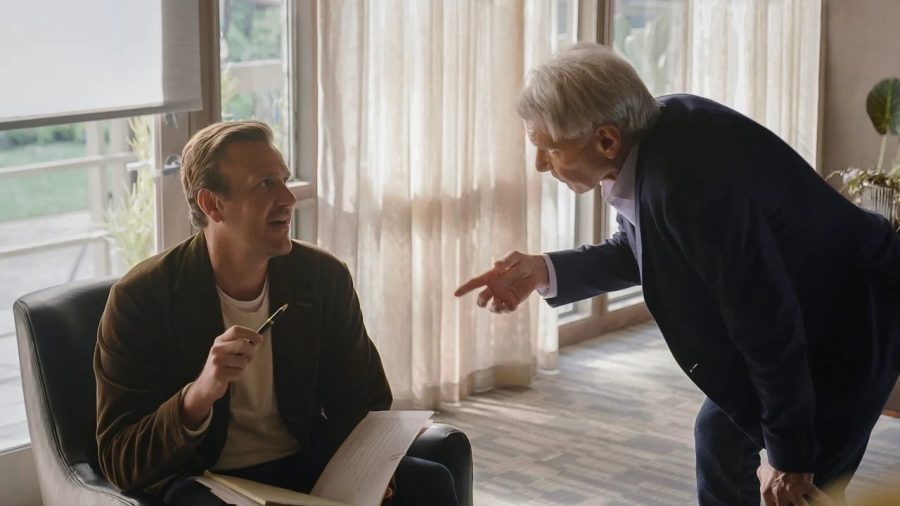Shrinking Aces Comedy in Emotionally Stirring First Season on Apple TV+
Jason Segal and Harrison Ford star in Shrinking.
Jason Segel hasn’t actually been involved in anything noteworthy since How I Met Your Mother aired its finale nine years ago. Given the drought of — and frankly, lack of demand for — performances from Segel, I’ve found it easy to relegate him to indefinite irrelevance. Similarly, I haven’t bothered with anything starring Harrison Ford since Star Wars: The Force Awakens and, for all intents and purposes, consider him past his prime. Burdened with these opinions of fantastic indifference, I confess that I am not the target audience Apple TV+ had in mind when producing its new series Shrinking, which co-stars Segel and Ford. A show led by two older white actors whose best work was seemingly behind them just didn’t seem up my alley. Yet, despite the potential for alienation, I loved every moment of Shrinking.
Based on the strangely popular comedy TV premise of a widower attempting to navigate life one year after his wife’s death, Shrinking follows Segel as a therapist at rock bottom. When the audience is introduced to Segel’s Jimmy, he is ankle-deep in drugs, depression, and a steady flow of sex workers. His relationships with his daughter, neighbor, best friend, coworkers, and mentors are nearly tattered beyond repair. In desperate need of a win, he gives one of his patients an ultimatum demanding that she either leave her husband or find a different therapist. Deciding not to heed the warnings of his boss and confidant, Ford’s Dr. Paul Rhodes, Jimmy becomes increasingly heavy-handed with his patients in an attempt to set their lives in order. Through their seeming improvement, Jimmy regains some of his own confidence and turns a corner in rebuilding his life.
While the show is essentially a comedy, it has the sensibility to deal with the heavier sides of its subject matter with gravity and allows space for each actor to deliver a tour de force of a performance. Segel showcased an unsurprisingly on-point comedic talent, but more notably had the opportunity to flex his dramatic range. He excellently portrayed the grief and growing desperation of a man at his lowest and thrived in the subtleties of his character. Switching between infectiously hilarious and drowning in sorrow on a dime, Segel brought more to the show than I expected him to and held the lead role with immaculate poise. What makes the performance especially noteworthy is Segel’s ability to hold his own against a veteran like Ford, who even now can pull off a cool, charismatic, instantly likable character with a heavy on-screen presence. Segel manages to be enigmatic with an inherent magnetism and enviable capacity for seeming within his comfort zone when faced with the toughest dramatic conditions. Ford is at his peak, Segel doesn’t miss a beat in their on-screen partnership, and together they make a series that successfully speaks to me in unexpected ways.
An unfortunate byproduct of such likable characters is that it becomes easy to ignore some of their more problematic tendencies. For instance, the entire show is predicated on a series of grossly unethical decisions by Jimmy, most of which are wrapped up in a tidy and fundamentally positive bow by the season finale. While some characters push back against Jimmy’s approach, he is mostly forgiven and more often lauded for his meddling. For example, one of his patients ends up kissing him, and, meanwhile, he takes a veteran with PTSD and anger issues to kickboxing classes when talking doesn’t seem to work. This critique may be extratextual, but Jimmy is an awful therapist who is somewhat venerated by his patients in a toxic equation that goes largely unacknowledged within the show. Given the weight the show gives these therapy sessions and mental health in general, it expects the audience to be serious about this discourse. Obviously, the audience knows the trouble with Jimmy’s choices, but I still found myself wishing for a therapist that would turn up in my home to give me the solutions to my problems. It may be an innocuous desire for a more direct therapist, but it is less than ideal to foster public expectations of effective therapy as something so inappropriately involved. For a show with three therapists at the heart of the story, the production severely undermines what therapy is really about. This doesn’t detract from the watchability of the series, but at the same time, it does stir some amount of discomfort in me as a viewer. Maybe the discomfort is an intentional choice by the showrunners, but, as it stands, that isn’t apparent in the writing.
Issues aside, it is worth noting that my enjoyment of this first season was augmented by the excellent work of the supporting cast. Arguably the highlight of the show in her best moments, Lukita Maxwell’s Alice is entertaining and compelling as a teenager navigating a complex network of friendship, desire, family relations, and mental health. A testament to Maxwell’s range is her ability to play soulful mourning in both comedic and dramatic tones, and the juxtaposition of the two often confronts the audience with a kind of emotional whiplash that makes it impossible to look away. I didn’t care much for most of the subplots, but the budding friendship between Christa Miller and Jessica Williams’ characters, Liz and Gaby, was overflowing with chemistry. Both characters go on their individual emotional journeys over the season, but they never get as much narrative attention as their performances warrant. Overall, the best moments in the show were when two or more of the supporting characters, especially Maxwell, Miller, and Williams, got involved in some kind of banter. Given the likelihood of a second season, I hope to see more scenes involving various combinations of these supporting characters, with significantly more emphasis on their narratives over
Jimmy’s plotline.
I have to commend Shrinking for what it is: entertaining, witty, and well directed, with quality acting and great music. It’s a show I intend to rewatch, with a first season that I would advise anyone with Apple TV+ to bump to the top of their watchlist. It is the kind of show that is worth investigating its problematic aspects, and something I see Oberlin students appreciating for its themes, humor, and discourse.











